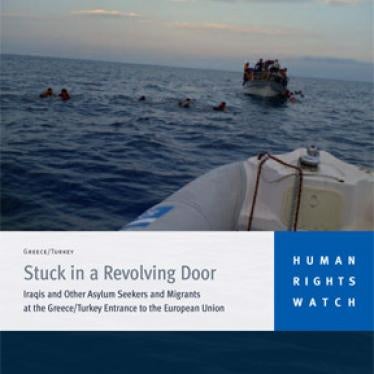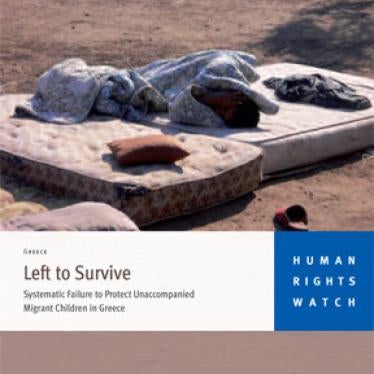(Paris) - Many of the hundreds of migrants arrested by French authorities following the destruction of their makeshift camp in Calais are at risk of being sent back to Greece, Human Rights Watch said today.
The French police reportedly arrested 276 migrants, including 125 children, on September 22, 2009, and destroyed their makeshift camp. The French immigration minister said several months ago that many asylum seekers entered through Greece and should be returned there. The New York Times, reporting on the situation, cited remarks by French officials that those who had entered the European Union through Greece would be returned there. The UK's home secretary is quoted in The Guardian expressing his "delight" at the Calais operation and saying that the migrants there could seek asylum in the first country they entered, meaning that many are likely to be returned to Greece.
"France, the UK, and the rest of Europe act as if everything is perfectly fine in Greece," said Bill Frelick, refugee policy director at Human Rights Watch. "But Greece denies 99.5 percent of all asylum claims, has recently eliminated its appeals procedure, and detains migrants in deplorable conditions."
Human Rights Watch said that France and the UK should ensure that any children among those removed who have family members in the UK, including siblings and other close relatives, are able to join them on humanitarian grounds.
Under the European Union's Dublin II regulations, the country where a person first entered the EU is generally held responsible for examining that person's asylum claim, whether or not the person applied there. European governments enter the fingerprints of all migrants they apprehend into an EU-wide database that allows other governments to trace where a person first entered the EU and to send that person back.
While the Dublin II regulations are premised on the notion that all EU member states have comparable asylum and migration practices, there are wide disparities, with some countries like Greece effectively offering no protection at all. This disparity underscores the importance of reforming the Dublin system and ensuring that EU member states are held to account for their failure to respect their obligations under EU law to provide access to asylum.
Human Rights Watch has called on European governments, in two reports released in 2008, to stop sending migrants and asylum seekers, including unaccompanied children, back to Greece under the Dublin II regulations. The reports said that Greece fails to guarantee a fair assessment of asylum claims, continues to detain migrants and asylum seekers in conditions that can be inhuman and degrading, and has not provided adequate reception conditions for migrants, or special protection for vulnerable groups, such as unaccompanied migrant children. Greece also adopted a law in July abolishing a meaningful appeals procedure. The new law leaves asylum seekers with no right to an appeal or remedy against risk of removal to inhuman or degrading treatment, as required by article 39 of the EU's procedures directive and articles 13 and 3 of the European Convention on Human Rights. Asylum seekers whose claim has been rejected are at risk of being immediately deported.
Concerns are further heightened, Human Rights Watch said, due to Greece's recent arrests of large numbers of asylum seekers and their transfer to detention centers in the north, close to the Turkish border, where some are reported to have been pushed across the border back to Turkey. Greece has a record of systematically pushing migrants back to Turkey, including those seeking protection.
On August 5, Human Rights Watch wrote to the Greek interior minister asking him to take immediate steps to stop this practice and to treat migrants apprehended in Greek territory in a humane and dignified manner.
In a November 2008 report, "Stuck in a Revolving Door: Iraqis and Other Asylum Seekers and Migrants at the Greece/Turkey Entrance to the European Union," Human Rights Watch documented how Greek authorities have systematically expelled migrants illegally across the Greece-Turkey border, in violation of international law. These "pushbacks" typically occur at night from the northern detention facilities, and they involve considerable logistical preparation. At that time, Human Rights Watch conducted private, confidential interviews in various locations in both Greece and Turkey with 41 asylum seekers and refugees, who gave consistent accounts of Greek authorities taking them to the Evros river at night and then forcing them across.
France and other EU member states are bound under the European Convention on Human Rights not to return a person to a country where he or she is at risk of inhuman and degrading treatment (Article 3) and bound by the international legal principle of nonrefoulement. The Dublin Convention allows parties to exercise their discretion under article 3 (2) (the sovereignty clause) not to return an asylum seeker and to examine the asylum claim themselves.
"It is hard not to have the impression that European governments are perfectly happy with Greece doing the dirty work for them and giving them the opportunity to get rid of these migrants, including potential refugees," Frelick said. "Instead of sending them back to Greece, French authorities should ensure these migrants have the chance to apply for asylum in France."








